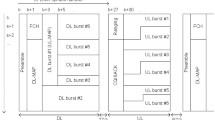Abstract
Recently there is a growing interest in the adaptive multimedia networking where the bandwidth of an ongoing multimedia call can be dynamically adjusted. In the wireless/mobile multimedia networks using the adaptive framework, the existing QoS provisioning focused on the call blocking probability and the forced termination probability should be modified. We, therefore, redefine a QoS parameter – the cell overload probability – from the viewpoint of the adaptive multimedia networking. Then, we propose a distributed call admission control (CAC) algorithm that guarantees the upper bound of the cell overload probability. Also, a bandwidth adaptation algorithm which seeks to minimize the cell overload probability is also presented. Simulation experiments are carried out to verify the performance of the proposed CAC algorithm. Furthermore, the performance of the adaptive wireless/mobile network is compared to that of the existing non-adaptive wireless/mobile networks. As a further step in QoS provisioning, we propose another QoS parameter, the degradation period ratio, and discuss analytically how the CAC algorithm guarantees the upper bound of the degradation period ratio.
Similar content being viewed by others
References
A. Alwan et al., Adaptive mobile multimedia networks, IEEE Communications Magazine 34(4) (April 1996) 34–51.
V. Bharghavan, K. Lee, S. Lu, S. Ha, J. Li and D. Dwyer, The TIMELY adaptive resource management architecture, IEEE Personal Communications Magazine 5(8) (August 1998).
S.K. Das and S.K. Sen, Quality-of-Service degradation strategies in multimedia wireless networks, in: IEEE Vehicular Technology Conference (VTC'98), Ottawa, Canada (May 1998).
J. Gomez, A. Campbell and H. Morikawa, A systems approach to prediction, compensation and adaptation in wireless packet networks, in: Proc. of ACM/IEEE International Workshop on Wireless and Mobile Multimedia (WoWMoM'98), Dallas (October 1998) pp. 92–100.
R. Howard, Dynamic Probabilistic Systems, Vol. 1, Markov Models (Wiley, 1971).
N. Yeadon, Filters: QoS support mechanisms for multipeer communications, IEEE Journal on Selected Areas in Communications 14(7) (September 1996) 1245–1262.
ITU-T, Recommendation H.263, Video codec for low bitrate communication (1996).
F.P. Kelly, Fixed point models of loss networks, Journal of Australian Mathemathical Society B(31) (1989) 204–218.
A. Leon-Garcia, Probability and Random Processes for Electrical Engineering (Addison Wesley, 1994).
Y.-b. Lin et al., Queueing priority channel assignment strategies for PCS hand-off and initial access, IEEE Transactions on Vehicular Technology 43(3) (August 1994) 704–712.
S. Lu et al., Adaptive service in mobile computing environments, in: IWQOS'97, New York (1997).
M. Naghshineh and M. Schwarz, Distributed call admission control in mobile/wireless networks, in: IEEE PIMRC'95 (1995) pp. 289–293.
M. Naghshineh and M. Willebeek-LeMair, End-to-end QoS provisioning in multimedia wireless/mobile networks using an adaptive framework, IEEE Communications Magazine 35(11) (November 1997) 72–81.
D.L. Pallant, A reduced load approximation for cellular mobile networks including handovers, Australia Telecommunications Research 26(2) (1992) 21–29.
S.S. Rappaport, The multiple-call hand-off problem in high-capacity cellular communications systems, IEEE Transactions on Vehicular Technology 40(3) (August 1991) 546–557.
S. Sen et al., Quality of Service degradation strategies in multimedia wireless networks, in: IEEE VTC'98, Ottawa (1998) pp. 1884–1888.
N. Shacham, Multipoint communication by hierarchically encoded data, in: IEEE INFOCOM'92 (1992) pp. 2107–2114.
A. Sutivong and J.M. Peha, Novel heuristics for call admission control in cellular systems, in: IEEE ICUPC'97 (1997) pp. 129–133.
A.K. Talukdar, B.R. Badrinath and A. Acharya, Rate adaptation schemes in networks with mobile hosts, in: ACM/IEEE MobiCom'98 (October 1998).
Author information
Authors and Affiliations
Rights and permissions
About this article
Cite this article
Kwon, T., Choi, Y., Bisdikian, C. et al. QoS Provisioning in Wireless/Mobile Multimedia Networks Using an Adaptive Framework. Wireless Networks 9, 51–59 (2003). https://doi.org/10.1023/A:1020877007305
Issue Date:
DOI: https://doi.org/10.1023/A:1020877007305




